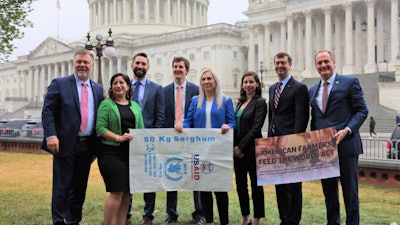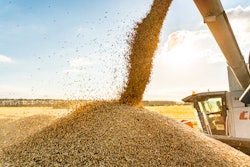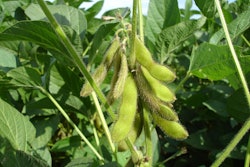
A new bipartisan bill has been introduced to ensure food grown in the U.S. is sent as international aid instead of using taxpayer money to buy food from the nation’s competitors.
On June 22, Representatives Tracey Mann (R-KS-01), John Garamendi (D-CA-08), Rick Crawford (R-AR-01) and Jimmy Panetta (D-CA-19) introduced theAmerican Farmers Feed the World Act of 2023.
The bipartisan effort is designed to keep the "food" in America’s international food aid programs as Congress looks to reauthorize theFarm Bill in 2023.
“America’s international food aid programs have enjoyed bipartisan support for more than 65 years because they are simple, effective, and they feed millions of vulnerable people around the world each year,” said Rep. Mann. “Through these programs, America fortifies our allies, counters the influence of foreign adversaries, creates new markets and trading partners, and stops wars before they start."
As part of this legislation, Congress would restore the original intent of the Food for Peace program without spending additional Farm Bill resources, all while safeguarding the interests of American producers. The Food for Peace Act's purpose was to use America's vast agricultural surplus to fight world hunger.
The American Farmers Feed the World Act focuses on transparency and accountability by ending the program's reliance on cash transfers overseas and reducing programmatic overhead costs.
“American food aid should be produced in America,” said Rep. Crawford. “It is disingenuous to continue to use funds to purchase foreign commodities and call it 'American aid.' By preserving resources to purchase life-saving food, this legislation would ensure that at least 50% of the budget is allocated to acquiring American-grown commodities and delivering them to the destination country."
According to the lawmakers, the act would:
- Restore the emphasis on American food.This act would reinstate the Food for Peace program’s original intent to allow American farmers to share their production to fight global hunger and would stop using American taxpayer dollars to purchase food from America’s agricultural competitors.
- 恢复的透明度。This act would end the program’s use of cash transfers overseas, reduce programmatic overhead costs, preserve resources to purchase life-saving food, and protect at least 50% of the budget for purchasing American-grown commodities and delivering them to the destination country.
- Restore accountability.This act would require the U.S. Agency for International Development (USAID) to report to Congress on all account and program implementation details. Additionally, this act requires USDA approval before USAID considers overriding congressional intent.
- Restore efficiency.This act would create a more effective release mechanism for the Bill Emerson Humanitarian Trust in favor of a streamlined USDA release protocol
"Over time, a shift from American commodities to cash assistance has undermined this mission,” said Rep. Panetta. "I’m proud to introduce this bipartisan legislation to restore the original intent of these international food aid programs and ensure they are prioritizing American-grown commodities. Doing so will improve transparency, accountability, efficiency, and effectiveness of international food assistance."
NAMA: American-grown commodities have been a cornerstone to fight hunger
TheNorth American Millers’ Association(NAMA) noted the use of American-grown commodities in international food aid has been a cornerstone of U.S. foreign assistance programs for decades. Over time, however, the shift to cash vouchers and purchasing commodities from international competitors has been detrimental to the program.
"U.S. millers are proud of the role they play in alleviating world hunger through food aid. We applaud ... this effort to bolster U.S. international food assistance at zero cost to the American taxpayer,” said Kim Cooper, NAMA senior director of government affairs.
“These reforms are long overdue and will ensure the longevity of these critical, life-saving programs by restoring them to their roots of being purely in-kind donation programs."
Wheat industry applauds the effort
The American Farmers Feed the World Act of 2023 would allow American wheat farmers to share their production and contribute to the fight against global hunger, said Brent Cheyne,National Association of Wheat Growers(NAWG) president and Oregon wheat farmer.
“Wheat is a staple whole grain that accounts for roughly 20% of calories consumed globally," said Cheyne. "Over the years, we have witnessed a shift away from utilizing American commodities in food aid programs, which has eroded transparency, accountability, and bipartisan support.
"As we look toward reauthorizing the Farm Bill later this year, this bipartisan legislation is a crucial step toward renewing the role of American agriculture in fighting global hunger," he continued. "It demonstrates our commitment to providing food aid to vulnerable populations while supporting our farmers over that of foreign ag competitors.”





















